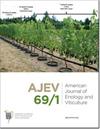合作与补偿减轻杀菌剂耐药性
IF 1.8
3区 农林科学
Q3 BIOTECHNOLOGY & APPLIED MICROBIOLOGY
引用次数: 0
摘要
我们评估了葡萄种植者对杀菌剂耐药性的认识,以及调整杀菌剂使用方法以缓解葡萄园中这一问题的意愿。我们对美国的一小群葡萄种植者进行了一项试点研究,以评估他们对杀菌剂耐药性的了解,并根据使用杀菌剂对自己农场和邻近农场利润的影响来调整杀菌剂使用的意愿。我们发现,尽管种植者通常愿意在有助于减轻耐药性的情况下调整他们的杀菌剂使用做法,但当这种调整会对他们的利润产生负面影响时,他们不太愿意这样做。我们还评估了当利润损失得到补偿时,他们调整杀菌剂使用的意愿。为了了解他们在有补偿的情况下改变做法的意愿与基线意愿(无补偿)之间的关系,我们进行了逻辑回归。考虑到小样本推断,我们使用了自举估计,并观察到在有补偿的情况下,种植者调整杀菌剂使用的意愿有所增加。我们的分析强调了货币补偿作为对抗杀菌剂耐药性的激励措施的重要性。本文章由计算机程序翻译,如有差异,请以英文原文为准。
Cooperation and Compensation to Mitigate Fungicide Resistance
We evaluated grapegrowers’ awareness of fungicide resistance and willingness to adjust fungicide use practices to mitigate this problem in vineyards. We conducted a pilot study surveying a small group of grapegrowers in the United States to assess their knowledge about fungicide resistance and willingness to adjust fungicide use based on the effect that use had on their own farm and their neighboring farms’ profits. We found that though growers are generally willing to adjust their fungicide use practices if assisted with the mitigation of resistance, they were less willing to do so when that adjustment would negatively affect their profits. We also evaluated their willingness to adjust their fungicide use when lost profits were remediated with compensation. To understand the relationship between their willingness to change their practices with compensation and their baseline willingness to do so (without compensation), we conducted a logistic regression. Given the small sample inference, we used bootstrapped estimates and observed an increase on growers’ willingness to adjust their fungicide use when compensation was available. Our analysis underscores the importance of monetary compensation as an incentive to fight against fungicide resistance.
求助全文
通过发布文献求助,成功后即可免费获取论文全文。
去求助
来源期刊

American Journal of Enology and Viticulture
农林科学-生物工程与应用微生物
CiteScore
3.80
自引率
10.50%
发文量
27
审稿时长
12-24 weeks
期刊介绍:
The American Journal of Enology and Viticulture (AJEV), published quarterly, is an official journal of the American Society for Enology and Viticulture (ASEV) and is the premier journal in the English language dedicated to scientific research on winemaking and grapegrowing. AJEV publishes full-length research papers, literature reviews, research notes, and technical briefs on various aspects of enology and viticulture, including wine chemistry, sensory science, process engineering, wine quality assessments, microbiology, methods development, plant pathogenesis, diseases and pests of grape, rootstock and clonal evaluation, effect of field practices, and grape genetics and breeding. All papers are peer reviewed, and authorship of papers is not limited to members of ASEV. The science editor, along with the viticulture, enology, and associate editors, are drawn from academic and research institutions worldwide and guide the content of the Journal.
 求助内容:
求助内容: 应助结果提醒方式:
应助结果提醒方式:


